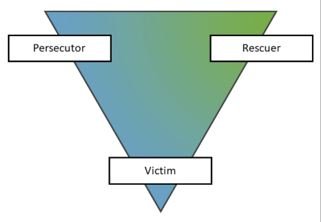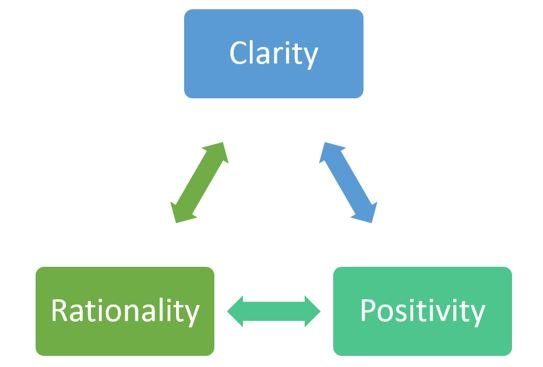Is the Karpman Drama Triangle Good for Resolving Conflicts?
Is the Karpman Drama Triangle Good for Resolving Conflicts?
The Karpman Drama Triangle is NOT a good method to understand how to resolve conflicts, because the method instructs us which behaviours do NOT work, rather than telling us which behaviours do work.
Models which tell us which behaviours do NOT work, are of strictly limited value.
If we learn that the right answer to a problem is NOT nine, or ten, or fifteen, then how much useful knowledge have we gained?
Not much!

The Karpman Drama Triangle gives us three behaviours, which are represented by three points forming a triangle.
We are told that the space inside the triangle represents what NOT to do because these three behaviours do NOT work.
The solutions to our conflict problems are to be found OUTSIDE The Karpman drama triangle - "Somewhere".
The Three Behaviours of the Karpman Drama Triangle.
The three behaviours of the Karpman Drama Triangle are: Victim, Rescuer, Persecutor.
1. The Victim
In conflict situations, don't act as though you are a victim of others. This only serves to weaken your self-image and lends emotional strength to others.
2. The Rescuer
In conflict situations, don't pretend to be the rescuer of victims. Maybe other people don't want to be rescued by you, because they don't have a victim mentality.
And if they DO have a victim mentality, then the arrival of the "Rescuer" reinforces victims' low opinion of themselves.
3. The Persecutor (aka Villain)
In conflicts, don't perform the role of The Persecutor (the Villain) because these terms imply a host of bad behaviours: being aggressive, threatening, oppressive authoritarian, rigid, and bullying.
If solutions to conflict problems are found only outside the Karpman drama triangle behaviours, then what positive skills sets DO we need, in order to best resolve conflicts?
The Clear, Rational, Positive Triangle.
The three correct principles that underpin the correct answers to conflict management are: Clarity, Rationality, Positivity.

1. Clarity
We manage conflicts using only clear ideas, clearly expressed. We are always able to make ourselves clearly understood.
2. Rationality
We manage conflicts according to rational principles: ie we find solutions by reference to facts, logic, objectivity, written policies and laws.
3. Positivity
Our intentions are always honourable and positive: We intend to find practical solutions that are mutually beneficial to all parties, and which represent a mutual exchange of values.
Conflict Handling Training
If you want to learn exactly how to resolve conflicts according to clear, rational and positive principles, we recommend you attend our Conflict Handling training course.
Definition: Karpman Drama Triangle
The Karpman Drama Triangle is a conflict model used at work and at home. It shows three unhelpful roles – victim, rescuer and persecutor – placed on the corners of a triangle. The idea is that people switch between these roles, keeping the fight going. It helps spot bad habits but offers no clear way to fix them.
Show CG4D Definition
- Lists three bad roles: victim, rescuer, persecutor
- Draws the roles on a triangle shape
- Shows people move from one role to another, which keeps the argument going
- Used to spot harmful conflict habits, not to give fixes
Article Summary
Because the Karpman Drama Triangle lists roles to avoid, it fails to solve disputes; we fix conflict when we speak with clear words, calm logic and positive aims that help all sides win.
Frequently Asked Questions
Here are some questions that frequently get asked about this topic during our training sessions.
What is the Karpman Drama Triangle?
Why does the article say the drama triangle does not resolve conflict?
What are the three roles named in the drama triangle?
Where should I look for answers to conflict if not inside the triangle?
How does clarity help settle a dispute?
What role does rationality play in conflict management?
Why is positivity important when resolving disagreements?
Thought of something that's not been answered?
Did You Know: Key Statistics
CIPD’s 2024 ‘Managing Conflict in the Modern Workplace’ survey shows 35% of UK staff faced at least one serious work dispute in the last 12 months. Gartner HR 2023 research found firms that give staff formal conflict-resolution training cut the time managers spend on disputes from 26% to 13% of their week.Blogs by Email
Do you want to receive an email whenever we post a new blog? The blogs contain article 5-10 minutes long - ideal for reading during your coffee break!
Further Reading in Conflict Management and Handling Difficult People
-
Dealing With Difficult Behaviour at Work
Learn ten clear steps to handle difficult behaviour at work, defuse emotion, find facts and agree future-focused solutions that lift team performance.
Read Article > -
Using Reason to Handle Difficult People
Use reason, facts and fair limits to handle difficult people, cut conflict time and build respect. Discover logical tips that turn heated talks into teamwork.
Read Article > -
How to Manage Bullying in the Workplace
Learn how to manage workplace bullying with a twelve-step process, legal tips and policy advice. Stop physical, verbal and positional abuse; protect teams.
Read Article > -
Conflict Resolution Skills
Learn seven conflict resolution skills, from listening and questioning to negotiation and emotional control, to end workplace conflict fast and cut costs.
Read Article > -
Grievances at Work
Prevent grievances at work and handle employee complaints fast with a six-step method that cuts costs and boosts morale through clear manager communication.
Read Article >
Looking for Conflict Management Training?
If you're looking to develop your Conflict Management and Handling Difficult People Skills, you may find this Conflict Management Training Course beneficial:
Open Training Course Pricing and Availability
Next Open Course Starts in 4 days, Online - Teams, places available






